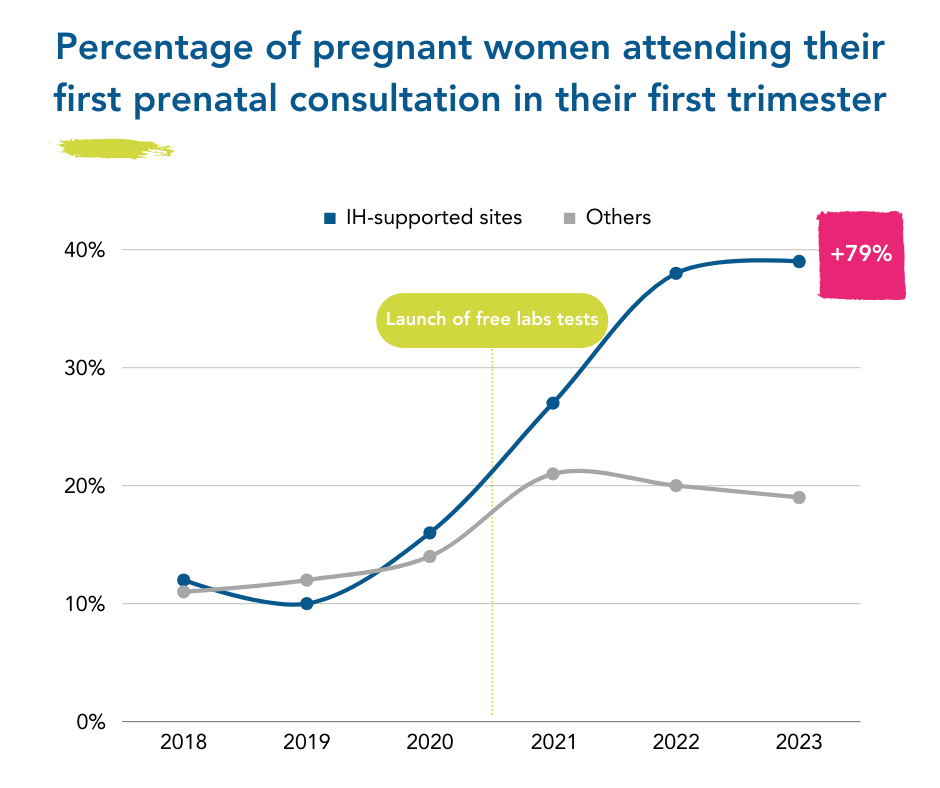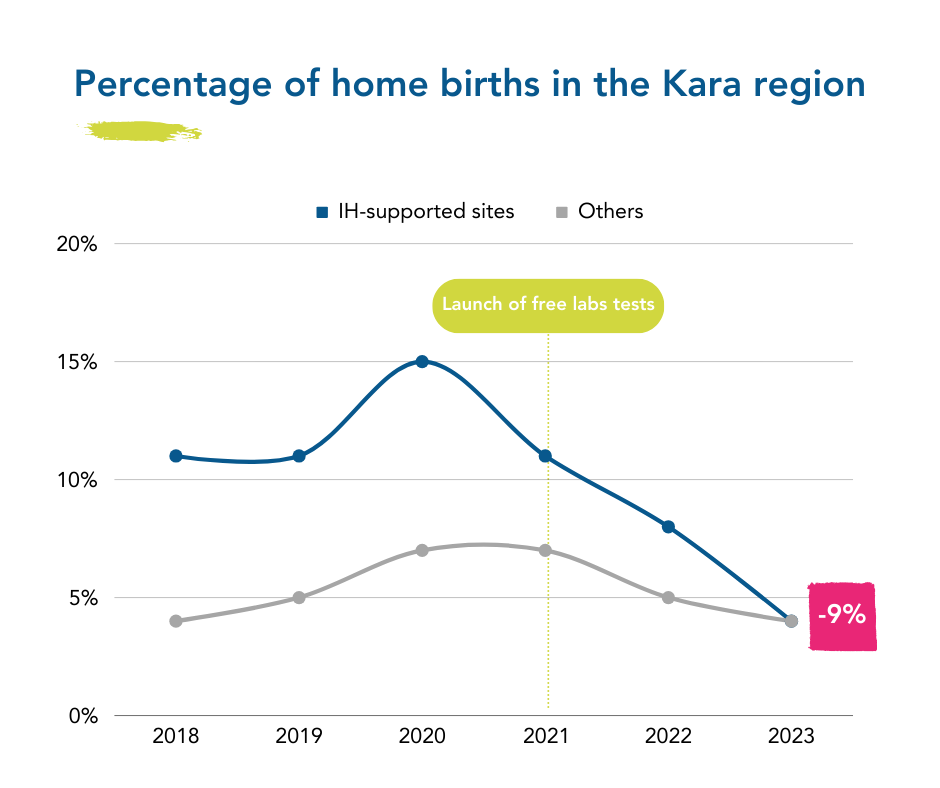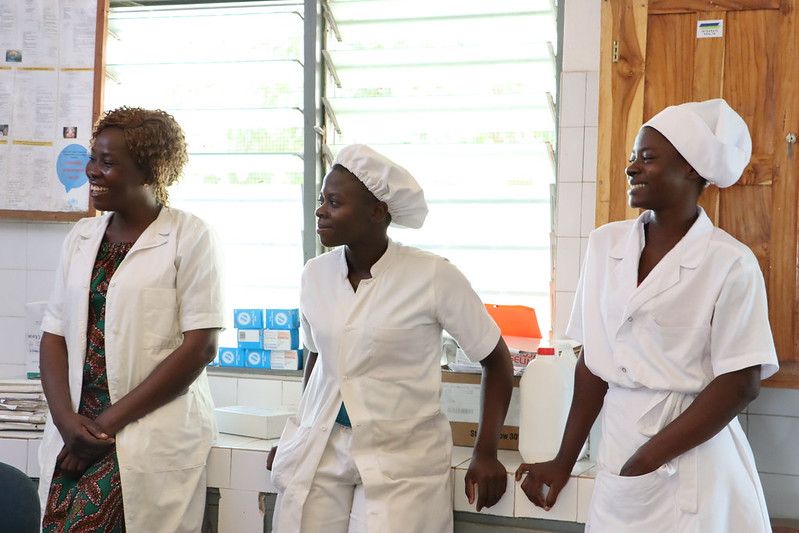After six years of the Integrated Primary Care Program implementation, challenges persisted in reducing the number of home births, despite the provision of free essential prenatal care and delivery. So, we investigated. We talked to patients and interviewed maternal health providers. We soon found out that the cost of prenatal lab tests was a deterring factor for women to attend all four prenatal consultations, which are critical to reduce the number of home-based deliveries. Prenatal consultations offer a space to discuss, inform, and better plan births with the family, but they also are the opportunity to detect high-risk pregnancies. Education and timely referral of these pregnancies are key to ensure that women deliver their babies in the best conditions.
To address this, in July 2021 Integrate Health incorporated free prenatal lab tests into the package of free prenatal services it offers, providing free access to six essential analyses. These included complete blood counts, blood typing, glucose levels, stool exams, hemoglobin levels, and urine tests—critical to avoid dangerous complications and keep moms and babies safe and healthy. Now, two years on, we embarked on a thorough evaluation to assess and realign the project’s goals, ensuring it continues to drive the impactful change we envision for maternal health.
Evaluating the impact of free prenatal lab tests
The initiative underwent a rigorous evaluation to measure its effectiveness and to understand the depth of its impact on prenatal care. With the overarching goal of evaluating the entire project, we wanted to understand if making prenatal lab tests free would reduce the number of home births, enhance early prenatal consultations within the first trimester, and support an improvement in the rate of women receiving at least four prenatal care visits.
Results and impact
Making prenatal lab tests free since July 2021 made a significant impact, with 15,850 women benefiting from 78,077 free tests. This represents 95% of all pregnant women, ensuring broad access to essential prenatal care. Overall, looking at the impact on prenatal care and home birth, the program not only met but exceeded its targets, also performing very well against sites not supported by Integrate Health.

First trimester prenatal consultations saw a significant rise, increasing by 79%, meaning that nearly 40% of pregnant women started receiving prenatal care in their first trimester. In addition, there was a notable 120% increase in the number of women receiving at least four prenatal visits throughout their pregnancy, the World Health Organization recommendation for sufficient pregnancy monitoring.

The number of home births also significantly declined, achieving a 9% reduction—surpassing the 5-percentage point goal.
This initiative has not only provided expectant mothers with access to crucial health screenings but has also empowered them with the knowledge and security needed during pregnancy, enhancing both their well-being and that of their babies. The tangible reduction in home births and the increase in early consultations underscore the program’s profound benefit to women’s health.
“Since 2021, when Integrate Health began providing free prenatal lab tests in our area, we have witnessed a heartening rise in prenatal consultations compared to previous years. This initiative has empowered women to seek early prenatal care. When they learn that the expenses are covered by Integrate Health, they rush to the health center. This is a testament to the positive impact in the lives of mothers and their unborn children.”
Sébastien Palawia, Clinic Coordinator
Strengths, limitations, and future directions
The program’s strengths were evident in their ability to reach and engage women in remote areas. It showcased the potential of targeted healthcare initiatives to make a profound impact. However, the evaluation also highlighted some limitations, such as logistical challenges in delivering services and the need for further community education. Integrate Health is dedicated to addressing these challenges and expanding the reach of the program, with a vision to continuously improve maternal healthcare services.
“This project has significantly empowered pregnant women to take essential steps for a healthy and risk-free pregnancy. Through early prenatal consultations, women are now able to detect complications sooner, ensuring better care and management. We are now exploring new approaches to evaluate and compare these figures with health centers not supported by Integrate Health for more in-depth assessments.”
Marie-José Dédé Ekoué, Data Analyst
Integrate Health’s free prenatal labs initiative is more than a healthcare program; it’s a movement towards a future where access to free and comprehensive maternal health services is a right, not a privilege. This initiative exemplifies how targeted, compassionate healthcare interventions can lead to dramatic improvements in the lives of mothers and their children. As we look ahead, Integrate Health remains committed to nurturing this movement, ensuring that every expectant mother has access to the care she deserves.

